Unit 4 Don't eat in class.单元考点精讲课件(46张PPT)
文档属性
| 名称 | Unit 4 Don't eat in class.单元考点精讲课件(46张PPT) | 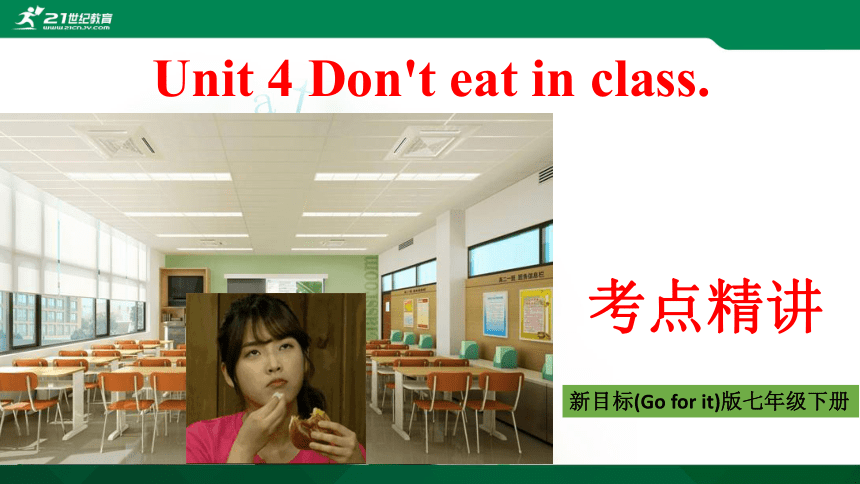 | |
| 格式 | ppt | ||
| 文件大小 | 8.5MB | ||
| 资源类型 | 试卷 | ||
| 版本资源 | 人教新目标(Go for it)版 | ||
| 科目 | 英语 | ||
| 更新时间 | 2023-01-29 21:18:28 | ||
图片预览

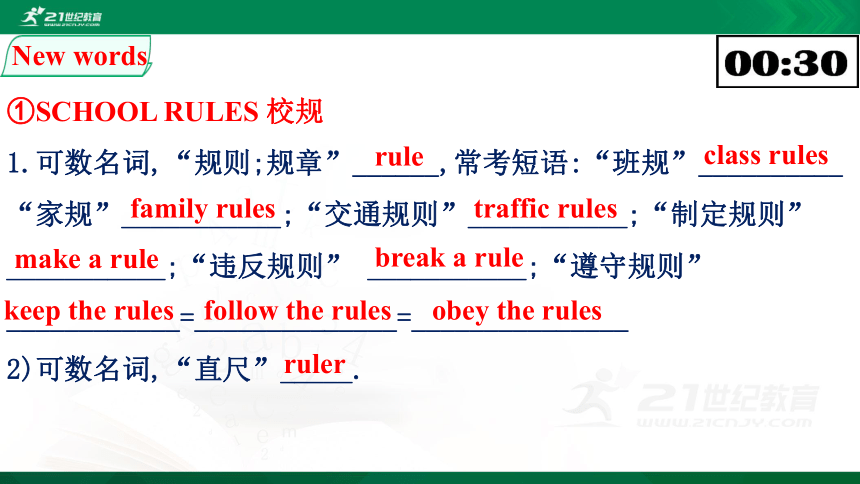
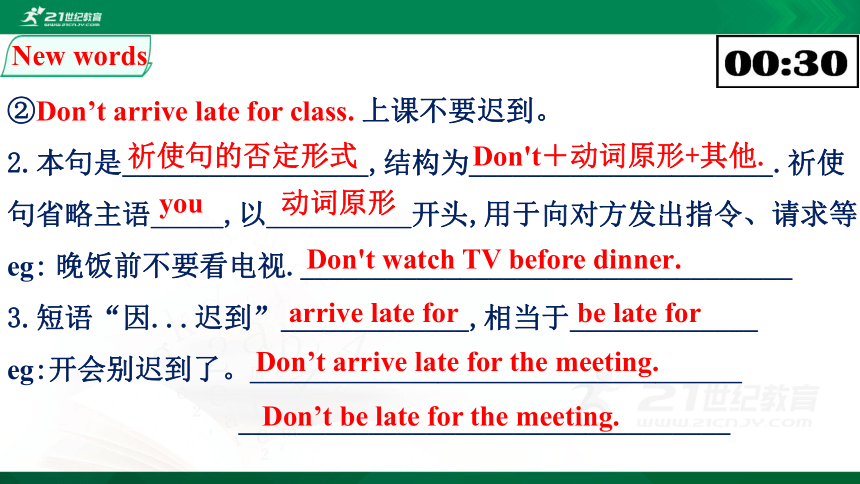
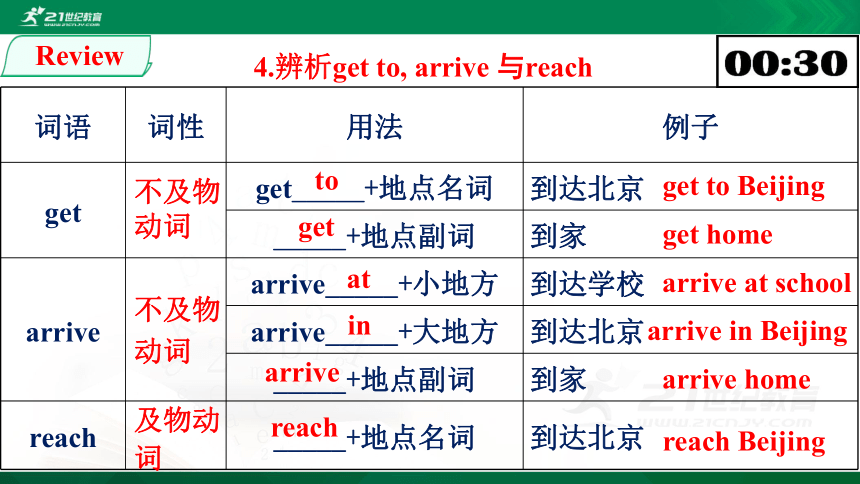
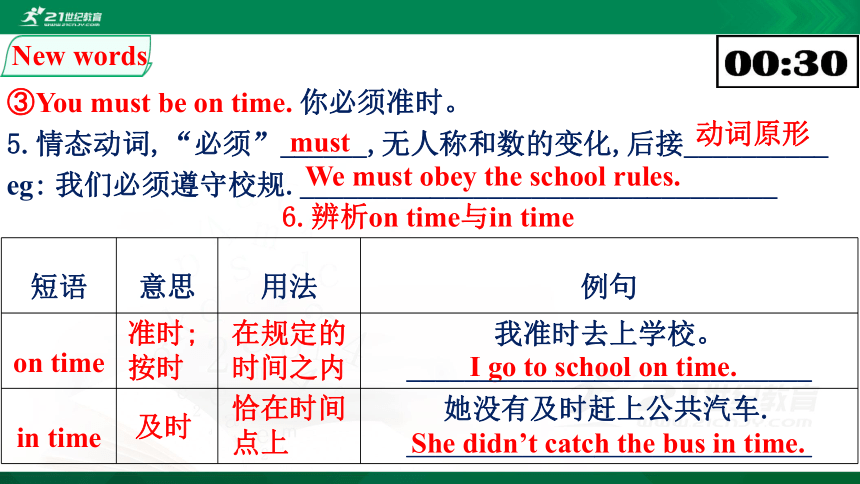
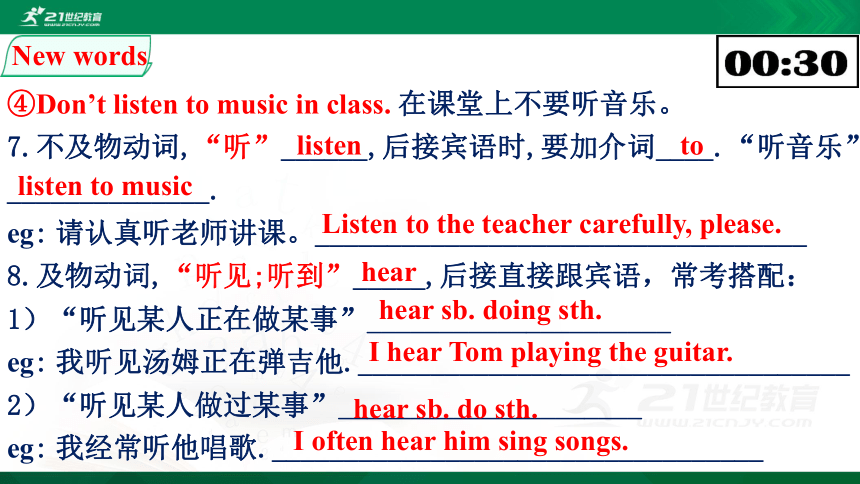
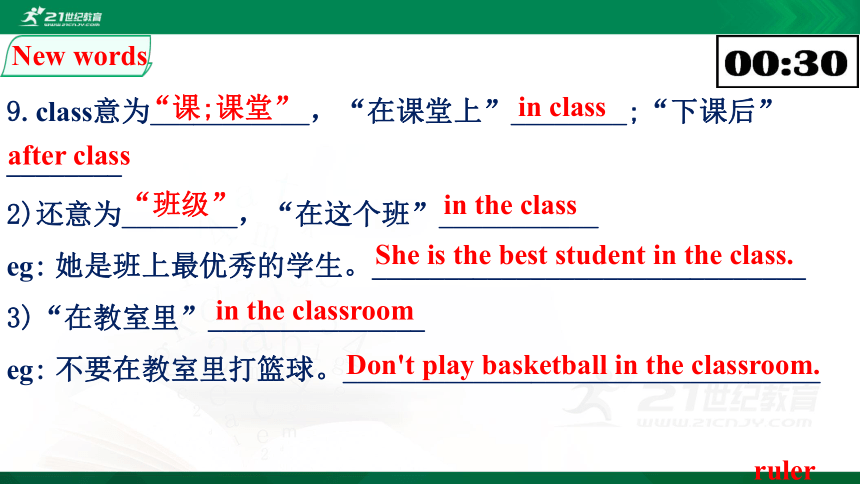
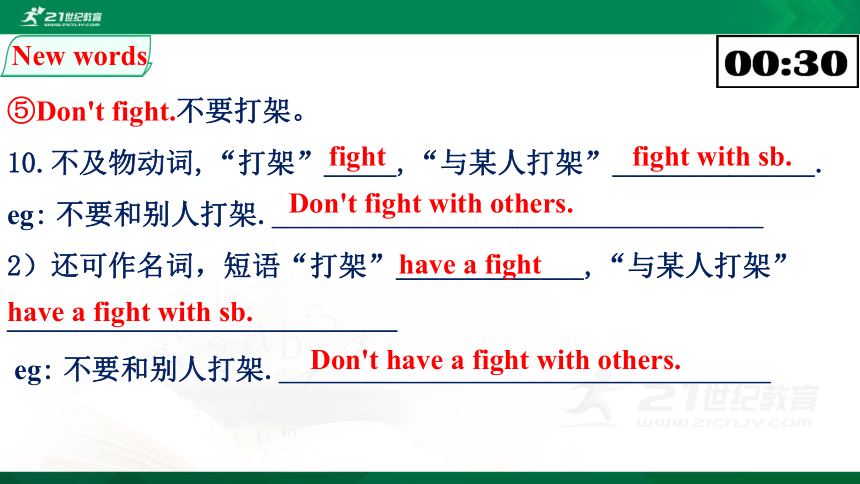
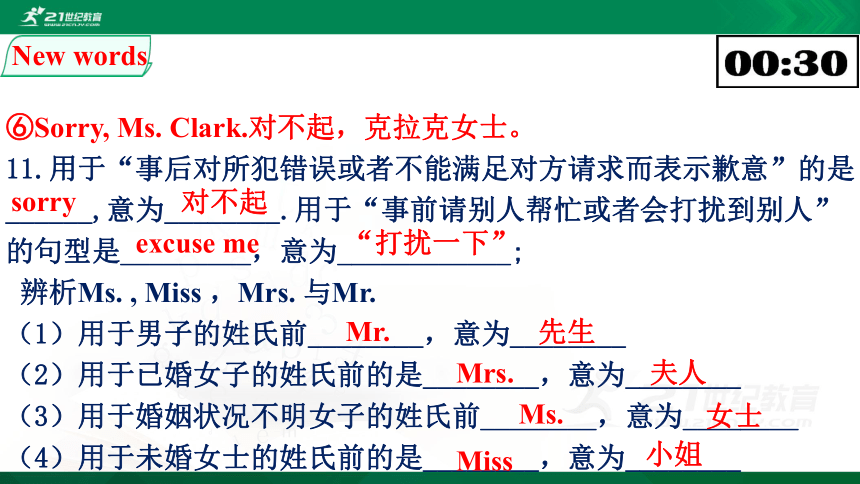
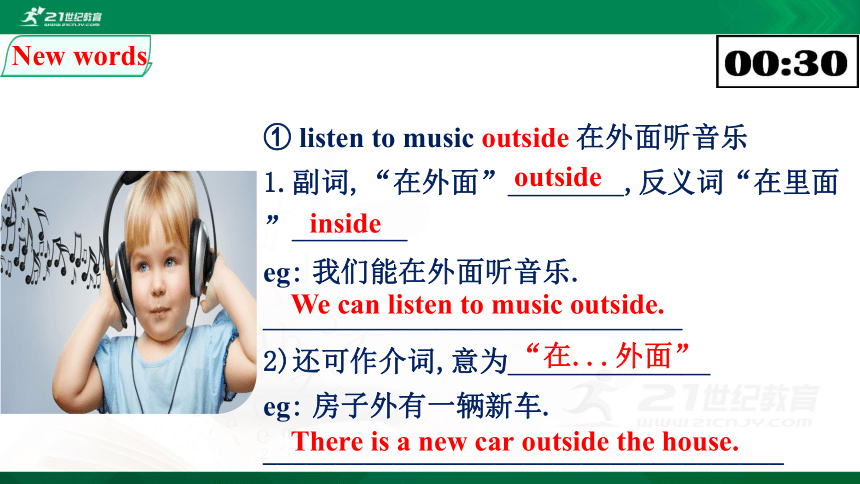
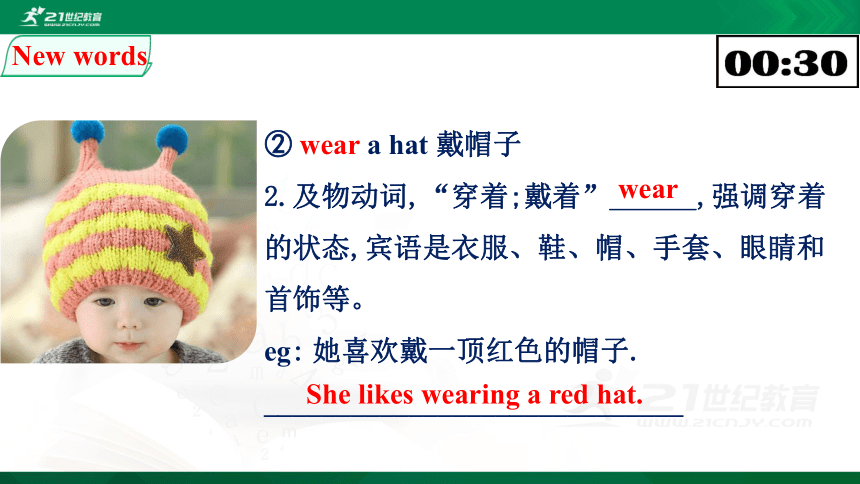
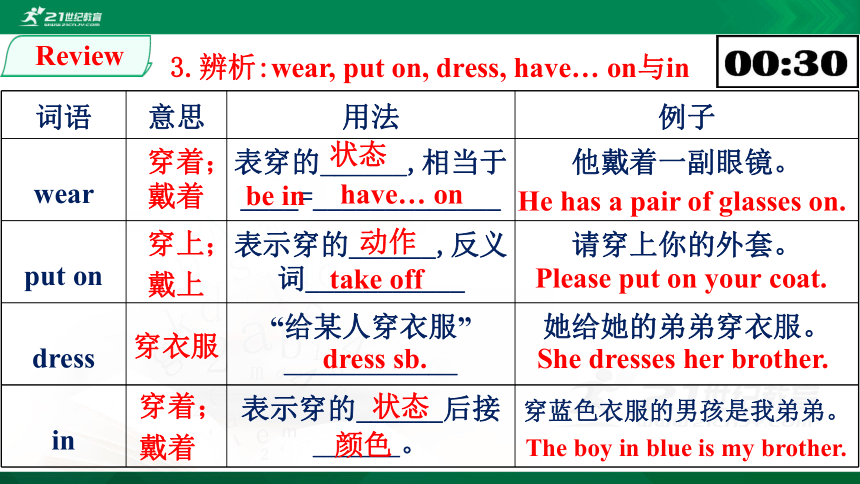
文档简介
(共46张PPT)
Unit 4 Don't eat in class.
考点精讲
新目标(Go for it)版七年级下册
①SCHOOL RULES 校规
1.可数名词,“规则;规章”______,常考短语:“班规”__________
“家规”___________;“交通规则”___________;“制定规则” ___________;“违反规则” ___________;“遵守规则” ____________=______________=_______________
2)可数名词,“直尺”_____.
rule
class rules
traffic rules
make a rule
family rules
keep the rules
break a rule
New words
follow the rules
obey the rules
ruler
②Don’t arrive late for class. 上课不要迟到。
2.本句是_________________,结构为_____________________.祈使句省略主语_____,以__________开头,用于向对方发出指令、请求等
eg: 晚饭前不要看电视.__________________________________
3.短语“因...迟到”_____________,相当于_____________
eg:开会别迟到了。__________________________________
__________________________________
祈使句的否定形式
you
New words
Don't+动词原形+其他.
动词原形
Don't watch TV before dinner.
arrive late for
be late for
Don’t arrive late for the meeting.
Don’t be late for the meeting.
不及物动词
arrive in Beijing
Review
reach Beijing
get to Beijing
to
in
at
arrive at school
4.辨析get to, arrive 与reach
词语 词性 用法 例子
get get_____+地点名词 到达北京
_____+地点副词 到家
arrive arrive_____+小地方 到达学校
arrive_____+大地方 到达北京
_____+地点副词 到家
reach _____+地点名词 到达北京
get
get home
不及物动词
arrive
arrive home
及物动词
reach
③You must be on time. 你必须准时。
5.情态动词,“必须”______,无人称和数的变化,后接__________
eg: 我们必须遵守校规._________________________________
must
动词原形
准时;按时
在规定的时间之内
We must obey the school rules.
及时
I go to school on time.
New words
恰在时间点上
She didn’t catch the bus in time.
6.辨析on time与in time
短语 意思 用法 例句
on time 我准时去上学校。
____________________________
in time 她没有及时赶上公共汽车.
____________________________
④Don’t listen to music in class. 在课堂上不要听音乐。
7.不及物动词,“听”______,后接宾语时,要加介词____.“听音乐” ______________.
eg: 请认真听老师讲课。__________________________________
8.及物动词,“听见;听到”_____,后接直接跟宾语,常考搭配:
1)“听见某人正在做某事”_____________________
eg: 我听见汤姆正在弹吉他.__________________________________
2)“听见某人做过某事”_____________________
eg: 我经常听他唱歌.__________________________________
listen
listen to music
New words
to
Listen to the teacher carefully, please.
hear
hear sb. doing sth.
I hear Tom playing the guitar.
hear sb. do sth.
I often hear him sing songs.
9.class意为___________,“在课堂上”________;“下课后” ________
2)还意为________,“在这个班”___________
eg: 她是班上最优秀的学生。______________________________
3)“在教室里”_______________
eg: 不要在教室里打篮球。_________________________________
“课;课堂”
in class
“班级”
in the class
after class
in the classroom
She is the best student in the class.
New words
Don't play basketball in the classroom.
ruler
⑤Don't fight.不要打架。
10.不及物动词,“打架”_____,“与某人打架”______________.
eg: 不要和别人打架.__________________________________
2)还可作名词,短语“打架”_____________,“与某人打架” ___________________________
eg: 不要和别人打架.__________________________________
fight
Don't fight with others.
New words
fight with sb.
have a fight
have a fight with sb.
Don't have a fight with others.
⑥Sorry, Ms. Clark.对不起,克拉克女士。
11.用于“事后对所犯错误或者不能满足对方请求而表示歉意”的是 ______,意为________.用于“事前请别人帮忙或者会打扰到别人”的句型是_________,意为____________;
辨析Ms. , Miss ,Mrs. 与Mr.
(1)用于男子的姓氏前________,意为________
(2)用于已婚女子的姓氏前的是________,意为________
(3)用于婚姻状况不明女子的姓氏前________,意为________
(4)用于未婚女士的姓氏前的是________,意为________
excuse me
“打扰一下”
sorry
对不起
Mr.
先生
Mrs.
夫人
Ms.
女士
Miss
小姐
New words
① listen to music outside 在外面听音乐
1.副词,“在外面”________,反义词“在里面”________
eg: 我们能在外面听音乐. _____________________________
2)还可作介词,意为______________
eg: 房子外有一辆新车. ____________________________________
outside
inside
We can listen to music outside.
New words
“在...外面”
There is a new car outside the house.
② wear a hat 戴帽子
2.及物动词,“穿着;戴着”______,强调穿着的状态,宾语是衣服、鞋、帽、手套、眼睛和首饰等。
eg: 她喜欢戴一顶红色的帽子. _____________________________
wear
She likes wearing a red hat.
New words
穿着;戴着
Review
have… on
状态
take off
动作
穿衣服
3.辨析:wear, put on, dress, have… on与in
词语 意思 用法 例子
wear 表穿的______,相当于____=_____________ 他戴着一副眼镜。
put on 表示穿的______,反义词___________ 请穿上你的外套。
dress “给某人穿衣服”
____________ 她给她的弟弟穿衣服。
in 表示穿的______后接______。 穿蓝色衣服的男孩是我弟弟。
be in
He has a pair of glasses on.
穿上;戴上
Please put on your coat.
dress sb.
She dresses her brother.
穿着;戴着
状态
颜色
The boy in blue is my brother.
③ This is very important. 这是非常重要的。
4.形容词,“重要的”___________,名词形式“重要性”_________ ,反义词“不重要的”_____________
2)句型“对某人来说做某事是重要的”__________________________
eg: 对我们来说知道学习的重要性是重要的.
__________________________________________________
important
importance
It is important for sb. to do sth.
unimportant
New words
It is important for us to know the importance of study.
④ Can we bring music players to school 我们能把音乐播放机带到学校来吗?
bring...to...
带走
New words
Bring your book here.
me
Take your socks to her.
here
带来
5.辨析:bring 与take
词语 意思 搭配 用法 例子
bring 把...带来到...
__________ 常跟______________________ 把你的书带到这儿
把你的书带给我
take 把...带去到...
_________ 常跟______________________ 把你的袜子拿到那儿
把你的袜子拿给她
Bring your book to me.
take...to...
there
Take your socks there
her/him
⑤And we always have to wear the school uniform. 并且我们不得不穿着校服。
6.短语“不得不”________,后接__________,表示客观的影响而不得不做某事。
1)肯定句:__________________________________
eg: 汤姆不得不回家在九点.______________________
2)否定句:_______________________________________
eg: 汤姆不必回家在九点。__________________________________
2)一般疑问句:_______________________________________
eg: 汤姆不得不回家在九点吗?_____________________________
have to
主语+have/has to+动词原形+其他.
New words
动词原形
Tom has to go home at nine.
主语+don't/doesn't have to+动词原形+其他.
Tom doesn't have to go home at nine.
Do/Does主语+have to+动词原形+其他
DoesTom have to go home at nine
⑥Oh, and we also have to be quiet in the library.哦,还有,在图书馆我们也必须保持安静。
7.形容词“安静的”_____,反义词“吵闹的”______,副词“安静地” ________.
eg: 不要吵,请悄悄地开门.
______________________________________
2)短语“保持安静”_________=____________
eg: 请保持安静!_______________=__________________
quiet
noisy
Don't be noisy. Please open the door quietly.
be quiet
quietly
Be quiet,please!
keep quiet
New words
Keep quiet,please!
祈使句歌诀
祈使句,祈使句,请求、命令或建议。
主语是______常省去,_________开头记。
否定形式要注意,______放到句首去。
要讲客气用______,句首、句末没关系。
No doing! 需提起,表示________不小觑。
you
动词原形
Grammar
Don’t
please
“禁止”
动词原形(+宾语)+其他.
Eat in the dinning hall.
Be+表语(形容词)+其他.
祈使句的形式
1.肯定祈使句的形式
类型 结构 例句
Do型 吃东西在餐厅。
Be型 请保持安静!
Let型 让我来帮你。
Be quiet,please!
Let+宾语+动词原形+其他.
Let me help you.
Grammar
Don't
Don't forget me!
Don't be late!
祈使句的形式
2.否定祈使句的形式
Don't+let+宾语+动词原形+其他.
Let+宾语+not+动词原形+其他.
Don't let him go.
类型 结构 例句
Do型 在句首加_______ 不要忘记我!
Be型 不要迟到!
Let型 别让他走。
No型 禁止垂钓!
Let him not go.
No+ 名词/doing!
No fishing!
Grammar
不得不
后跟动词原形
has to
3.辨析have to与must
词语 意思 相同 例句
have to 第三人称单数_______
,疑问句或否定句要借助________,否定形式表示________ 因为他的自行车坏了,他不得不步行去上学。
must 情态动词,否定句mustn’t意为_______,否定回答可以用_______或_________ 我们必须努力学习。
我必须打扫所有的房间吗?
(否定回答)
do;does
“不必”
He has to walk to school because his bike is broken.
必须
“禁止”
needn’t
don’t have to
We must study hard.
No, you needn’t/don’t have to.
Grammar
1.短语“外出”_______.“从...出来”_________ ,反义词“进入(某处)”________.“把...放进...”_____________
eg: 在上学日的夜晚不要出去。_______________________________
eg: 我从教室出来进入餐厅。
_______________________________ __________________
eg: 麦克把书放进了书包。_______________________________
go out
go out of
Don't go out on school nights.
go into
New words
I go out of the classroom and go into the dining hall.
put...into...
Mike puts books into the schoolbag.
2.及物动词“练习”________.其后可接______________________作宾语.“练习吉他”_________________
短语“练习做某事”___________________
eg: 他每天练习弹钢琴。____________________________________
2)还可作不可数名词,意为________
eg: 熟能生巧。_______________________
practice
名词、代词或V-ing形式
practice doing sth.
practice the guitar
New words
He practices playing the piano every day.
“练习”
Practice makes perfect.
3.可数名词“碟;盘”______.“清洗餐具”_____________相当于 ______________。同义词_______
eg: 你外出前必须清洗餐具。
__________________________________________
2)还可作不可数名词,意为________
eg: 他喜欢凉菜。____________________
dish
do the dishes
You must do the dishes before you go out.
wash the dishes
New words
“菜肴”
He likes cold dishes.
plate
help his mom make breakfast 帮他妈妈做早餐
4.help意为帮助,做动词时结构:
①“在方面帮助某人”_______________
eg:我经常在英语方面帮助他。______________________________
②“帮助某人做某事”________________
eg:我经常帮助他学英语。______________________________
③“请随便用...”_______________
eg:请随便吃菜。______________________________
2)help还可以做不可数名词
eg:谢谢你的帮助。____________________= ________________
help sb.(to) do sth.
help sb.with sth.
I often help him with English.
I often help him (to) learn English.
Thanks for your help.
Thanks for helping me.
Review
help oneself to...
Please help yourself to the dishes.
5.含有make的短语:
①做早餐_______________
②整理某人的床铺____________________
③和…交朋友________________
④制造噪音_____________________
⑤制订规则_______________
⑥做风筝___________________
make friends with
make breakfast
make one's bed
make a noise
Review
make rules
make a kite
6.介词“在…以前”______.表示______,同义词____,反义词“在…以后”____
eg: 他通常晚饭前做家庭作业,晚饭后看电视。
__________________________________________
__________________________________________
2)还可作连词,意为____________,引导时间状语从句。
eg: 看电视之前你不得不先写作业。
_______________________________________________
before
时间
You have to do homework before you watch TV.
after
New words
“在…以前”
He usually does his homework after dinner and watches TV after dinner.
by
1.Get up now and make your bed!现在起床去铺床!
短语“铺床”_______________相当于 ______________。“上床睡觉”__________
eg: 起床后你必须铺床。
______________________________________
make one's bed
make the bed
go to bed
New words
You must make your bed after you get up.
My rules at home
2.wash the dirty dishes in the kitchen 洗厨房里的脏餐具
形容词“脏的”______反义词“干净的” ______.“厨房”________,“在厨房” ______________
eg: 别把脏餐具留在厨房里。
______________________________________
dirty
clean
kitchen
New words
in the kitchen
My rules at home
Don't leave the dirty dishes in the kitchen!
③.There are too many rules!规则太多了!
太多
可数名词复数
太多
too many books
New words
不可数名词
too many flowers
动词
3.辨析too many, too much与much too
短语 意思 用 法 例 句
too many 后接____________ 太多的书____________
太多的花____________
too much 后接____________
还可修饰______ 太多的作业____________
说得太多____________
much too 修饰______或____ 太胖____________
太远____________
too much homework
talk too much
太
形容词
副词
much too fat
much too far
④Don’t leave the dirty dishes in the kitchen! 别把脏碗留在厨房里!
4.及物动词“留下;剩下”______,过去式_______
⑴“把某人留在某地”__________________
eg:不要把小孩子留在家里。______________________________
⑵“把某物落在某地”__________________
eg:我把我的作业落在家里了。__________________________
2)还可意为_______,“离开A去B”___________________
eg: 我将要离开北京去上海。____________________________
“动身去B”___________________
eg: 我将要动身去上海。______________________________
leave sb. +地点状语
leave
left
Don’t leave little children at home.
Review
leave sth. +地点状语
I left my homework at home.
“离开”
leave A for B
I will leave Beijing for Shanghai.
leave for B
I will leave for Shanghai.
⑤At school,we have more rules-don't be noisy,don't eat in class,..在学校,我们有更多的规则——不能喧哗,不能在课堂上吃东西…
5.形容词“更多的”______.它是______和_______的比较级.
eg: 我有更多的书。_________________
eg: 现在河里有更多的水了。_________________________________
2)还可作代词,意为________
eg: 汤很美味。我想再来一些。
_____________________________________
more
many
I have more books.
much
New words
There is more water in the river now.
“更多”
The soup is delicious. I want some more.
6.形容词“吵闹的”______,反义词“安静的”______
eg: 不要在图书馆吵闹。_______________________________
2)名词形式“噪音”______,副词形式“吵闹地”_______
eg: 别出声。______________________
eg: 我的哥哥吃东西很吵。____________________
noisy
quiet
noisily
New words
noise
Don't be noisy in the library.
Don't make a noise.
My brother eats noisily.
⑥After dinner,I can't relax either.晚饭之后我也不能放松。
7.动词“放松;休息”______,相当于____或__________,其第三人称单数形式是______。
relax
rest
动词
New words
relaxes
have a rest
使放松
形容词
辨析relax, relaxing与relaxed
词语 词性 意思 用法 例句
relax 玩游戏总是使我放松。
relaxing 这部电影很令人放松。
relaxed 听完音乐后,他感到轻松。
令人放松的
修饰物
形容词
感到轻松的
修饰人
relax sb.
Playing games always relaxes me.
This film is very relaxing.
He is relaxed after listen to music.
⑦ I must read a book before I can watch TV. 在看电视前, 我必须读一本书。
读
read sth. to sb.或read sb. sth.
动作
New words
看
He is reading a book.
look at
词语 意思 用法 例句
read 给某人读某物__________
_______________________ 他正在看书。
look 强调看的_____,后跟宾语时用__________ 请看黑板。
see 强调看的______,“看电影”
____________ 我能看见很多鸟在树上。
watch 多指观看运动着的事物,
看___________________等。 他每天晚上都看电视。
8.辨析read, watch, see与look
Look at the blackboard,please.
看见
结果
see a movie
I can see many birds in the tree.
观看
电视、比赛、表演
He watches TV every evening.
⑥I know how you feel.我明白你的感受。
9.这是一个在含有how引导的__________的主从复合句,主句的主语是__,谓语是______,宾语是特殊疑问句,原句为_______________,
宾语从句要用_______语序.
eg: 你知道从北京到上海有多远吗?
_________________________________________________
宾语从句
I
“how do you feel ”
know
New words
陈述句
Do you know how far it is from Beijing to Shanghai
“感受;觉得”
系动词
New words
形容词
词语 词性 用法 意思 主语 例句
feel
后跟
______ 我今天觉得很高兴。
石头摸起来很硬。
人
I feel happy today.
“摸起来”
物
The stone feels hard.
10.feel的考点
⑦Parents and schools are sometimes strict, but remember, they make rules to help us.父母和学校有时是严格的,但是要记住,他们制订规则是为了帮助我们。
11.形容词“严格的,严厉的”______.
⑴“对某人要求严格”_________________
eg: 我父母总是对我要求严格。______________________________
⑵“对某事要求严格”_________________
eg:我们的老师对他的工作要求严格。_________________________
strict
be strict with sb.
be strict in sth.
My parents are always strict with me.
New words
Our teacher is strict in his work.
12.及物动词“记住;记起”__________,反义词“忘记”______.
⑴“记着做某事”(还没做)_________________
eg: 当你离开的时候,记着关门。
__________________________________________
⑵“记得已做过某事”(已经做了)_________________
eg:我记得在学校见过她。_______________________________
remember
forget
Remember to close the door when you leave.
remember to do sth.
New words
remember doing sth.
I remember seeing her at school.
We have to follow them.我们必须遵守。
13.及物动词,意为“遵守”______,“遵守规则”_____________.
eg: 我们应该遵守交通规则。______________________________
2)还可意为_________
eg: 请跟我来。______________________________
follow
follow the rules
“跟随”
We should follow the traffic rules.
New words
Please follow me.
Good luck! 祝你好运!
13.不可数名词“幸运;运气”_____,形容词“幸运的” ______,反义词“不幸的”________,副词“幸运地”________
eg: 他是个幸运的家伙,他幸运地找了一份好工作。
______________________________________________
2)祝福语“祝你好运!”__________,答语_________________
“祝某人好运”_______________
eg: 祝你好运!______________________________
luck
lucky
luckily
unlucky
New words
He is a lucky dog and he gets a good job luckily.
Good luck!
Thanks./Thank you.
good luck to sb.
Good luck to you!
①I have to keep my hair short. 我不得不留短发。
及物动词
保持
Please keep the window closed.
keep+宾语+宾语补足语
New words
遵守
follow
We all should keep the rules.
词语 词性 意思 用法 例句
keep 请让窗户关着。
同义词____ 我们都应该遵守规则。
后接____ 你可以借用这本书两周。
多吃水果,保持健康。
保留
时间段
You can keep the book for two weeks.
keep+adj.
系动词
保持
Eat more fruit and keep healthy.
2.不可数名词“头发”_____,表示头发的总称。
eg: 这个女孩留长发。________________________________
2)还作可数名词,表示“一根或几根头发”.
eg: 男孩长着三根头发。________________________________
hair
The girl keeps her hair long.
The boy has three hairs.
New words
②I have to learn play the piano.因为我不得不学习弹钢琴
3.及物动词“学习;学会”_____.
⑴“学习做某事”_________________
eg: 我想学习弹钢琴。________________________________
2)“向某人学习”_________________
eg: 我们应该向雷锋学习。________________________________
learn
learn to do sth.
I want to learn to play the piano.
New words
learn from sb.
We should learn from Lei Feng.
③I never have fun.我从未玩得开心过。
4.“玩得开心;过得愉快”________相当于________________或
______________
eg: 我们在聚会上玩得很开心。_________________________
________________________________
2)“做某事很开心”______________________
eg: 我愉快地玩游戏。________________________________
have fun
have a good time
enjoy oneself
New words
We have fun at the party.
We enjoy ourselves at the party.
have fun(in)doing sth.
I have fun playing games.
谢谢
21世纪教育网(www.21cnjy.com) 中小学教育资源网站
有大把高质量资料?一线教师?一线教研员?
欢迎加入21世纪教育网教师合作团队!!月薪过万不是梦!!
详情请看:
https://www.21cnjy.com/help/help_extract.php
Unit 4 Don't eat in class.
考点精讲
新目标(Go for it)版七年级下册
①SCHOOL RULES 校规
1.可数名词,“规则;规章”______,常考短语:“班规”__________
“家规”___________;“交通规则”___________;“制定规则” ___________;“违反规则” ___________;“遵守规则” ____________=______________=_______________
2)可数名词,“直尺”_____.
rule
class rules
traffic rules
make a rule
family rules
keep the rules
break a rule
New words
follow the rules
obey the rules
ruler
②Don’t arrive late for class. 上课不要迟到。
2.本句是_________________,结构为_____________________.祈使句省略主语_____,以__________开头,用于向对方发出指令、请求等
eg: 晚饭前不要看电视.__________________________________
3.短语“因...迟到”_____________,相当于_____________
eg:开会别迟到了。__________________________________
__________________________________
祈使句的否定形式
you
New words
Don't+动词原形+其他.
动词原形
Don't watch TV before dinner.
arrive late for
be late for
Don’t arrive late for the meeting.
Don’t be late for the meeting.
不及物动词
arrive in Beijing
Review
reach Beijing
get to Beijing
to
in
at
arrive at school
4.辨析get to, arrive 与reach
词语 词性 用法 例子
get get_____+地点名词 到达北京
_____+地点副词 到家
arrive arrive_____+小地方 到达学校
arrive_____+大地方 到达北京
_____+地点副词 到家
reach _____+地点名词 到达北京
get
get home
不及物动词
arrive
arrive home
及物动词
reach
③You must be on time. 你必须准时。
5.情态动词,“必须”______,无人称和数的变化,后接__________
eg: 我们必须遵守校规._________________________________
must
动词原形
准时;按时
在规定的时间之内
We must obey the school rules.
及时
I go to school on time.
New words
恰在时间点上
She didn’t catch the bus in time.
6.辨析on time与in time
短语 意思 用法 例句
on time 我准时去上学校。
____________________________
in time 她没有及时赶上公共汽车.
____________________________
④Don’t listen to music in class. 在课堂上不要听音乐。
7.不及物动词,“听”______,后接宾语时,要加介词____.“听音乐” ______________.
eg: 请认真听老师讲课。__________________________________
8.及物动词,“听见;听到”_____,后接直接跟宾语,常考搭配:
1)“听见某人正在做某事”_____________________
eg: 我听见汤姆正在弹吉他.__________________________________
2)“听见某人做过某事”_____________________
eg: 我经常听他唱歌.__________________________________
listen
listen to music
New words
to
Listen to the teacher carefully, please.
hear
hear sb. doing sth.
I hear Tom playing the guitar.
hear sb. do sth.
I often hear him sing songs.
9.class意为___________,“在课堂上”________;“下课后” ________
2)还意为________,“在这个班”___________
eg: 她是班上最优秀的学生。______________________________
3)“在教室里”_______________
eg: 不要在教室里打篮球。_________________________________
“课;课堂”
in class
“班级”
in the class
after class
in the classroom
She is the best student in the class.
New words
Don't play basketball in the classroom.
ruler
⑤Don't fight.不要打架。
10.不及物动词,“打架”_____,“与某人打架”______________.
eg: 不要和别人打架.__________________________________
2)还可作名词,短语“打架”_____________,“与某人打架” ___________________________
eg: 不要和别人打架.__________________________________
fight
Don't fight with others.
New words
fight with sb.
have a fight
have a fight with sb.
Don't have a fight with others.
⑥Sorry, Ms. Clark.对不起,克拉克女士。
11.用于“事后对所犯错误或者不能满足对方请求而表示歉意”的是 ______,意为________.用于“事前请别人帮忙或者会打扰到别人”的句型是_________,意为____________;
辨析Ms. , Miss ,Mrs. 与Mr.
(1)用于男子的姓氏前________,意为________
(2)用于已婚女子的姓氏前的是________,意为________
(3)用于婚姻状况不明女子的姓氏前________,意为________
(4)用于未婚女士的姓氏前的是________,意为________
excuse me
“打扰一下”
sorry
对不起
Mr.
先生
Mrs.
夫人
Ms.
女士
Miss
小姐
New words
① listen to music outside 在外面听音乐
1.副词,“在外面”________,反义词“在里面”________
eg: 我们能在外面听音乐. _____________________________
2)还可作介词,意为______________
eg: 房子外有一辆新车. ____________________________________
outside
inside
We can listen to music outside.
New words
“在...外面”
There is a new car outside the house.
② wear a hat 戴帽子
2.及物动词,“穿着;戴着”______,强调穿着的状态,宾语是衣服、鞋、帽、手套、眼睛和首饰等。
eg: 她喜欢戴一顶红色的帽子. _____________________________
wear
She likes wearing a red hat.
New words
穿着;戴着
Review
have… on
状态
take off
动作
穿衣服
3.辨析:wear, put on, dress, have… on与in
词语 意思 用法 例子
wear 表穿的______,相当于____=_____________ 他戴着一副眼镜。
put on 表示穿的______,反义词___________ 请穿上你的外套。
dress “给某人穿衣服”
____________ 她给她的弟弟穿衣服。
in 表示穿的______后接______。 穿蓝色衣服的男孩是我弟弟。
be in
He has a pair of glasses on.
穿上;戴上
Please put on your coat.
dress sb.
She dresses her brother.
穿着;戴着
状态
颜色
The boy in blue is my brother.
③ This is very important. 这是非常重要的。
4.形容词,“重要的”___________,名词形式“重要性”_________ ,反义词“不重要的”_____________
2)句型“对某人来说做某事是重要的”__________________________
eg: 对我们来说知道学习的重要性是重要的.
__________________________________________________
important
importance
It is important for sb. to do sth.
unimportant
New words
It is important for us to know the importance of study.
④ Can we bring music players to school 我们能把音乐播放机带到学校来吗?
bring...to...
带走
New words
Bring your book here.
me
Take your socks to her.
here
带来
5.辨析:bring 与take
词语 意思 搭配 用法 例子
bring 把...带来到...
__________ 常跟______________________ 把你的书带到这儿
把你的书带给我
take 把...带去到...
_________ 常跟______________________ 把你的袜子拿到那儿
把你的袜子拿给她
Bring your book to me.
take...to...
there
Take your socks there
her/him
⑤And we always have to wear the school uniform. 并且我们不得不穿着校服。
6.短语“不得不”________,后接__________,表示客观的影响而不得不做某事。
1)肯定句:__________________________________
eg: 汤姆不得不回家在九点.______________________
2)否定句:_______________________________________
eg: 汤姆不必回家在九点。__________________________________
2)一般疑问句:_______________________________________
eg: 汤姆不得不回家在九点吗?_____________________________
have to
主语+have/has to+动词原形+其他.
New words
动词原形
Tom has to go home at nine.
主语+don't/doesn't have to+动词原形+其他.
Tom doesn't have to go home at nine.
Do/Does主语+have to+动词原形+其他
DoesTom have to go home at nine
⑥Oh, and we also have to be quiet in the library.哦,还有,在图书馆我们也必须保持安静。
7.形容词“安静的”_____,反义词“吵闹的”______,副词“安静地” ________.
eg: 不要吵,请悄悄地开门.
______________________________________
2)短语“保持安静”_________=____________
eg: 请保持安静!_______________=__________________
quiet
noisy
Don't be noisy. Please open the door quietly.
be quiet
quietly
Be quiet,please!
keep quiet
New words
Keep quiet,please!
祈使句歌诀
祈使句,祈使句,请求、命令或建议。
主语是______常省去,_________开头记。
否定形式要注意,______放到句首去。
要讲客气用______,句首、句末没关系。
No doing! 需提起,表示________不小觑。
you
动词原形
Grammar
Don’t
please
“禁止”
动词原形(+宾语)+其他.
Eat in the dinning hall.
Be+表语(形容词)+其他.
祈使句的形式
1.肯定祈使句的形式
类型 结构 例句
Do型 吃东西在餐厅。
Be型 请保持安静!
Let型 让我来帮你。
Be quiet,please!
Let+宾语+动词原形+其他.
Let me help you.
Grammar
Don't
Don't forget me!
Don't be late!
祈使句的形式
2.否定祈使句的形式
Don't+let+宾语+动词原形+其他.
Let+宾语+not+动词原形+其他.
Don't let him go.
类型 结构 例句
Do型 在句首加_______ 不要忘记我!
Be型 不要迟到!
Let型 别让他走。
No型 禁止垂钓!
Let him not go.
No+ 名词/doing!
No fishing!
Grammar
不得不
后跟动词原形
has to
3.辨析have to与must
词语 意思 相同 例句
have to 第三人称单数_______
,疑问句或否定句要借助________,否定形式表示________ 因为他的自行车坏了,他不得不步行去上学。
must 情态动词,否定句mustn’t意为_______,否定回答可以用_______或_________ 我们必须努力学习。
我必须打扫所有的房间吗?
(否定回答)
do;does
“不必”
He has to walk to school because his bike is broken.
必须
“禁止”
needn’t
don’t have to
We must study hard.
No, you needn’t/don’t have to.
Grammar
1.短语“外出”_______.“从...出来”_________ ,反义词“进入(某处)”________.“把...放进...”_____________
eg: 在上学日的夜晚不要出去。_______________________________
eg: 我从教室出来进入餐厅。
_______________________________ __________________
eg: 麦克把书放进了书包。_______________________________
go out
go out of
Don't go out on school nights.
go into
New words
I go out of the classroom and go into the dining hall.
put...into...
Mike puts books into the schoolbag.
2.及物动词“练习”________.其后可接______________________作宾语.“练习吉他”_________________
短语“练习做某事”___________________
eg: 他每天练习弹钢琴。____________________________________
2)还可作不可数名词,意为________
eg: 熟能生巧。_______________________
practice
名词、代词或V-ing形式
practice doing sth.
practice the guitar
New words
He practices playing the piano every day.
“练习”
Practice makes perfect.
3.可数名词“碟;盘”______.“清洗餐具”_____________相当于 ______________。同义词_______
eg: 你外出前必须清洗餐具。
__________________________________________
2)还可作不可数名词,意为________
eg: 他喜欢凉菜。____________________
dish
do the dishes
You must do the dishes before you go out.
wash the dishes
New words
“菜肴”
He likes cold dishes.
plate
help his mom make breakfast 帮他妈妈做早餐
4.help意为帮助,做动词时结构:
①“在方面帮助某人”_______________
eg:我经常在英语方面帮助他。______________________________
②“帮助某人做某事”________________
eg:我经常帮助他学英语。______________________________
③“请随便用...”_______________
eg:请随便吃菜。______________________________
2)help还可以做不可数名词
eg:谢谢你的帮助。____________________= ________________
help sb.(to) do sth.
help sb.with sth.
I often help him with English.
I often help him (to) learn English.
Thanks for your help.
Thanks for helping me.
Review
help oneself to...
Please help yourself to the dishes.
5.含有make的短语:
①做早餐_______________
②整理某人的床铺____________________
③和…交朋友________________
④制造噪音_____________________
⑤制订规则_______________
⑥做风筝___________________
make friends with
make breakfast
make one's bed
make a noise
Review
make rules
make a kite
6.介词“在…以前”______.表示______,同义词____,反义词“在…以后”____
eg: 他通常晚饭前做家庭作业,晚饭后看电视。
__________________________________________
__________________________________________
2)还可作连词,意为____________,引导时间状语从句。
eg: 看电视之前你不得不先写作业。
_______________________________________________
before
时间
You have to do homework before you watch TV.
after
New words
“在…以前”
He usually does his homework after dinner and watches TV after dinner.
by
1.Get up now and make your bed!现在起床去铺床!
短语“铺床”_______________相当于 ______________。“上床睡觉”__________
eg: 起床后你必须铺床。
______________________________________
make one's bed
make the bed
go to bed
New words
You must make your bed after you get up.
My rules at home
2.wash the dirty dishes in the kitchen 洗厨房里的脏餐具
形容词“脏的”______反义词“干净的” ______.“厨房”________,“在厨房” ______________
eg: 别把脏餐具留在厨房里。
______________________________________
dirty
clean
kitchen
New words
in the kitchen
My rules at home
Don't leave the dirty dishes in the kitchen!
③.There are too many rules!规则太多了!
太多
可数名词复数
太多
too many books
New words
不可数名词
too many flowers
动词
3.辨析too many, too much与much too
短语 意思 用 法 例 句
too many 后接____________ 太多的书____________
太多的花____________
too much 后接____________
还可修饰______ 太多的作业____________
说得太多____________
much too 修饰______或____ 太胖____________
太远____________
too much homework
talk too much
太
形容词
副词
much too fat
much too far
④Don’t leave the dirty dishes in the kitchen! 别把脏碗留在厨房里!
4.及物动词“留下;剩下”______,过去式_______
⑴“把某人留在某地”__________________
eg:不要把小孩子留在家里。______________________________
⑵“把某物落在某地”__________________
eg:我把我的作业落在家里了。__________________________
2)还可意为_______,“离开A去B”___________________
eg: 我将要离开北京去上海。____________________________
“动身去B”___________________
eg: 我将要动身去上海。______________________________
leave sb. +地点状语
leave
left
Don’t leave little children at home.
Review
leave sth. +地点状语
I left my homework at home.
“离开”
leave A for B
I will leave Beijing for Shanghai.
leave for B
I will leave for Shanghai.
⑤At school,we have more rules-don't be noisy,don't eat in class,..在学校,我们有更多的规则——不能喧哗,不能在课堂上吃东西…
5.形容词“更多的”______.它是______和_______的比较级.
eg: 我有更多的书。_________________
eg: 现在河里有更多的水了。_________________________________
2)还可作代词,意为________
eg: 汤很美味。我想再来一些。
_____________________________________
more
many
I have more books.
much
New words
There is more water in the river now.
“更多”
The soup is delicious. I want some more.
6.形容词“吵闹的”______,反义词“安静的”______
eg: 不要在图书馆吵闹。_______________________________
2)名词形式“噪音”______,副词形式“吵闹地”_______
eg: 别出声。______________________
eg: 我的哥哥吃东西很吵。____________________
noisy
quiet
noisily
New words
noise
Don't be noisy in the library.
Don't make a noise.
My brother eats noisily.
⑥After dinner,I can't relax either.晚饭之后我也不能放松。
7.动词“放松;休息”______,相当于____或__________,其第三人称单数形式是______。
relax
rest
动词
New words
relaxes
have a rest
使放松
形容词
辨析relax, relaxing与relaxed
词语 词性 意思 用法 例句
relax 玩游戏总是使我放松。
relaxing 这部电影很令人放松。
relaxed 听完音乐后,他感到轻松。
令人放松的
修饰物
形容词
感到轻松的
修饰人
relax sb.
Playing games always relaxes me.
This film is very relaxing.
He is relaxed after listen to music.
⑦ I must read a book before I can watch TV. 在看电视前, 我必须读一本书。
读
read sth. to sb.或read sb. sth.
动作
New words
看
He is reading a book.
look at
词语 意思 用法 例句
read 给某人读某物__________
_______________________ 他正在看书。
look 强调看的_____,后跟宾语时用__________ 请看黑板。
see 强调看的______,“看电影”
____________ 我能看见很多鸟在树上。
watch 多指观看运动着的事物,
看___________________等。 他每天晚上都看电视。
8.辨析read, watch, see与look
Look at the blackboard,please.
看见
结果
see a movie
I can see many birds in the tree.
观看
电视、比赛、表演
He watches TV every evening.
⑥I know how you feel.我明白你的感受。
9.这是一个在含有how引导的__________的主从复合句,主句的主语是__,谓语是______,宾语是特殊疑问句,原句为_______________,
宾语从句要用_______语序.
eg: 你知道从北京到上海有多远吗?
_________________________________________________
宾语从句
I
“how do you feel ”
know
New words
陈述句
Do you know how far it is from Beijing to Shanghai
“感受;觉得”
系动词
New words
形容词
词语 词性 用法 意思 主语 例句
feel
后跟
______ 我今天觉得很高兴。
石头摸起来很硬。
人
I feel happy today.
“摸起来”
物
The stone feels hard.
10.feel的考点
⑦Parents and schools are sometimes strict, but remember, they make rules to help us.父母和学校有时是严格的,但是要记住,他们制订规则是为了帮助我们。
11.形容词“严格的,严厉的”______.
⑴“对某人要求严格”_________________
eg: 我父母总是对我要求严格。______________________________
⑵“对某事要求严格”_________________
eg:我们的老师对他的工作要求严格。_________________________
strict
be strict with sb.
be strict in sth.
My parents are always strict with me.
New words
Our teacher is strict in his work.
12.及物动词“记住;记起”__________,反义词“忘记”______.
⑴“记着做某事”(还没做)_________________
eg: 当你离开的时候,记着关门。
__________________________________________
⑵“记得已做过某事”(已经做了)_________________
eg:我记得在学校见过她。_______________________________
remember
forget
Remember to close the door when you leave.
remember to do sth.
New words
remember doing sth.
I remember seeing her at school.
We have to follow them.我们必须遵守。
13.及物动词,意为“遵守”______,“遵守规则”_____________.
eg: 我们应该遵守交通规则。______________________________
2)还可意为_________
eg: 请跟我来。______________________________
follow
follow the rules
“跟随”
We should follow the traffic rules.
New words
Please follow me.
Good luck! 祝你好运!
13.不可数名词“幸运;运气”_____,形容词“幸运的” ______,反义词“不幸的”________,副词“幸运地”________
eg: 他是个幸运的家伙,他幸运地找了一份好工作。
______________________________________________
2)祝福语“祝你好运!”__________,答语_________________
“祝某人好运”_______________
eg: 祝你好运!______________________________
luck
lucky
luckily
unlucky
New words
He is a lucky dog and he gets a good job luckily.
Good luck!
Thanks./Thank you.
good luck to sb.
Good luck to you!
①I have to keep my hair short. 我不得不留短发。
及物动词
保持
Please keep the window closed.
keep+宾语+宾语补足语
New words
遵守
follow
We all should keep the rules.
词语 词性 意思 用法 例句
keep 请让窗户关着。
同义词____ 我们都应该遵守规则。
后接____ 你可以借用这本书两周。
多吃水果,保持健康。
保留
时间段
You can keep the book for two weeks.
keep+adj.
系动词
保持
Eat more fruit and keep healthy.
2.不可数名词“头发”_____,表示头发的总称。
eg: 这个女孩留长发。________________________________
2)还作可数名词,表示“一根或几根头发”.
eg: 男孩长着三根头发。________________________________
hair
The girl keeps her hair long.
The boy has three hairs.
New words
②I have to learn play the piano.因为我不得不学习弹钢琴
3.及物动词“学习;学会”_____.
⑴“学习做某事”_________________
eg: 我想学习弹钢琴。________________________________
2)“向某人学习”_________________
eg: 我们应该向雷锋学习。________________________________
learn
learn to do sth.
I want to learn to play the piano.
New words
learn from sb.
We should learn from Lei Feng.
③I never have fun.我从未玩得开心过。
4.“玩得开心;过得愉快”________相当于________________或
______________
eg: 我们在聚会上玩得很开心。_________________________
________________________________
2)“做某事很开心”______________________
eg: 我愉快地玩游戏。________________________________
have fun
have a good time
enjoy oneself
New words
We have fun at the party.
We enjoy ourselves at the party.
have fun(in)doing sth.
I have fun playing games.
谢谢
21世纪教育网(www.21cnjy.com) 中小学教育资源网站
有大把高质量资料?一线教师?一线教研员?
欢迎加入21世纪教育网教师合作团队!!月薪过万不是梦!!
详情请看:
https://www.21cnjy.com/help/help_extract.php
同课章节目录
- Unit 1 Can you play the guitar?
- Section A
- Section B
- Unit 2 What time do you go to school?
- Section A
- Section B
- Unit 3 How do you get to school?
- Section A
- Section B
- Unit 4 Don't eat in class.
- Section A
- Section B
- Unit 5 Why do you like pandas?
- Section A
- Section B
- Unit 6 I'm watching TV.
- Section A
- Section B
- Review of Units 1-6
- Unit 7 It's raining!
- Section A
- Section B
- Unit 8 Is there a post office near here?
- Section A
- Section B
- Unit 9 What does he look like?
- Section A
- Section B
- Unit 10 I'd like some noodles.
- Section A
- Section B
- Unit 11 How was your school trip?
- Section A
- Section B
- Unit 12 What did you do last weekend?
- Section A
- Section B
